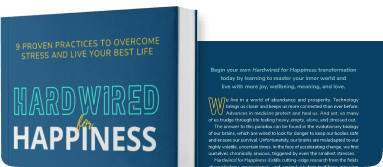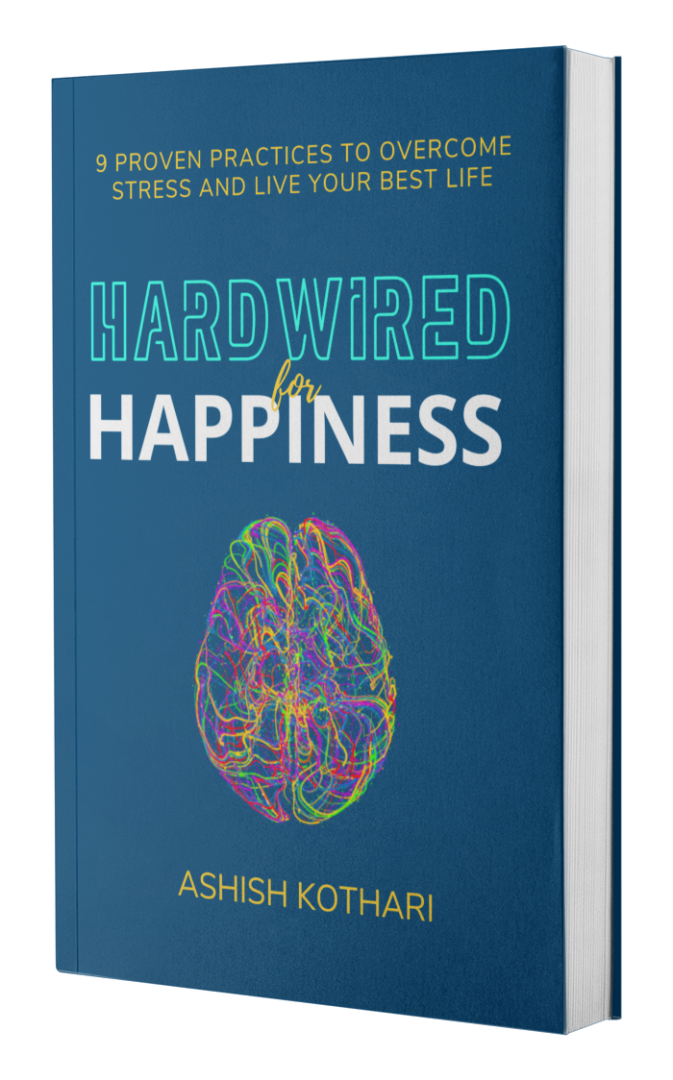Part 1: Breaking Free from Unhappiness Habits with Ashish Kothari

We are living in a time of great prosperity and innovation. With advancements like ChatGPT and AI, we’ve made significant leaps. Most things we do today can be done almost 90% faster. Yet, we are busier and lonelier than ever and struggling with lifestyle-related chronic ailments. Worse, we are more stressed, anxious, and less satisfied with life.
So, I wondered why we are struggling despite our prosperity. It turns out that we’ve been unconsciously making unhappiness a habit rather than fostering habits that make us happier. In this article, we’ll explore how to identify these “unhappiness habits” and develop strategies to break free from them.
“Only when we go back to living in rhythm with nature and take back control of those beautiful moments in the morning can we rewire away from fear and keep our fight-or-flight circuits more at rest.”
– Ashish Kothari
Often, subtle habits we develop over time can unknowingly chip away at our happiness. Here are a few of the most common ones:
Broken sleeping patterns
Do you use your phone as an alarm clock or sleep with it right next to you? A 2023 study says nearly 90% of Americans reach for their phone within the first 10 minutes of waking. Moreover, a 2020 study shows that 66% of Americans admit to sleeping with their phones at night. You might not be aware, but this can become an addiction that disrupts your natural rhythms of sleep.

What’s worse is that when we wake up and check our phones first thing in the morning, we see firsthand the negative events in the news, the perfect lives shown on social media, and the work emails that bring the day’s troubles. This information overload activates our fight-flight-or-freeze response, setting a stressful tone for the day, and that is no way to start your mornings.
Start your day without your phone
Remember that the moment we wake up is precious. Research shows it’s a liminal period between the unconscious and conscious states, a time of creativity. We often give away this creative potential by letting technology intrude.

So my advice to you is to try this experiment: leave your phone outside the bedroom and use a traditional alarm clock. When you wake up, spend a few minutes enjoying the transition between sleep and wakefulness. By doing this, you can set positive intentions for the day, learn gratitude or compassion, and take control of your mornings.
The habit of comparison
In modern times, the habit of comparison has been accentuated by our addiction to social media—Facebook, Instagram, Twitter, and YouTube—causing us to constantly compare ourselves not just to our neighbors but to the whole world. Let’s not forget that those posting their best moments also have struggles, but they aren’t sharing those.
We see what others have and feel like we don’t measure up. As a result, we feel less than, not smart enough, rich enough, thin enough, or fair enough, leading to a sense of unworthiness. To make up for this, we push ourselves to work harder and stay busier, living from a place of dissatisfaction and thinking that wanting more is good for us.
“Our desire within, our hunger within, is not for more; it’s for all. If we want to find happiness and satisfaction, we have to control our wants.”
– Ashish Kothari
Focus on what you have
My invitation to you is to try comparing yourself to those who have less instead of comparing yourself to those who have more.
If you think your house is not big or comfortable enough, remember those in Gaza or Ukraine who live in tents. If you think your kids’ school isn’t the best, remember many kids in the world have no access to school. If you have an injury, think about those who have lost limbs while protecting others.

By comparing ourselves to those who are less fortunate, we can remember to feel grateful for what we have and break the habit of unhealthy comparison.
Addiction to technology
The digital age has changed how we live. Our phones are practically glued to our hands now more than ever. Sure, technology offers undeniable advantages in communication, information access, and entertainment, but a growing body of research suggests that excessive use can contribute to stress and loss of focus.

This is evident in our daily lives – even brief moments of downtime, like waiting in an elevator or at a red light, often trigger an impulse to reach for our phones. This dependence has reached a point where many adults and teenagers experience anxiety when separated from their devices.
Create a habit of taking breaks
The key is to develop healthy habits for using technology and ensure it doesn’t dominate our lives. To break this habit, it’s crucial to create regular breaks from our phones. Our brains, like our bodies, need rest to function properly. Without breaks, we overload our brains with negative news and constant information, leading to overheating, loss of creativity, and exhaustion.

Instead of constantly checking your phone, take one or two-minute breaks throughout the day. Put your phone away and take one to five minutes of mindful breathing, or go for a walk, observe your surroundings, and stay present. This practice promotes rest and recovery, recharging us throughout the day.
Conclusion
The digital age offers incredible benefits, but it’s crucial to find a healthy balance. By setting boundaries and taking breaks, we can avoid the pitfalls of technology, fix our sleeping rhythms, break the habit of comparison, and rediscover the joy of the real world. So, put down your phone for a bit, take a deep breath, and enjoy all that life has to offer—both online and offline!
In this HAPPINESS SQUAD Podcast episode, Ashish Kothari, Founder of Happiness Squad, unravels the “unhappiness habits” that might be unconsciously chipping away at our well-being. Learn how to identify and break free from these unhappy practices that hold you back from a more fulfilling life.
Learn more about Ashish at his LinkedIn.
Listen to the podcast with Ashish below.
Access and subscribe to all of the episodes of the Flourishing Edge Podcast here.
Visit the REWIRE Program powered up by the HAPPINESS SQUAD Community and experience your shift within your 30-day risk-free trial today. Cultivate your Self-Awareness, Gratitude, Purpose, Community, and personal growth more through the 9 Hardwired for Happiness practices. Integrate simple and proven micro-practices grounded in the science of happiness and neuroscience of habit formation in 5 minutes a day.
Make Flourishing Your Competitive Edge.


